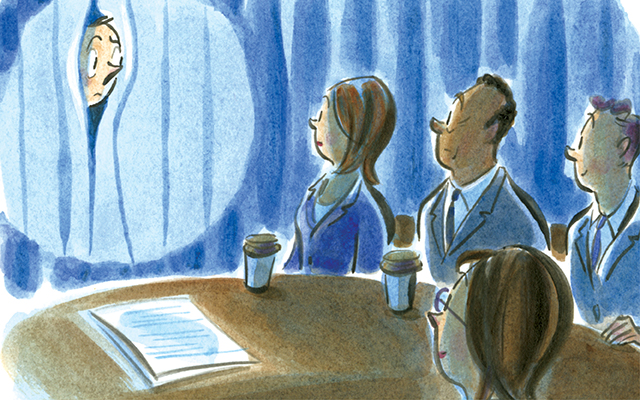I should have worn something different today.” “Why is she looking at me funny?” “I wish I hadn’t said that.” “What am I going to do if I’m asked a question I can’t answer?”
For some people, thoughts like these could make up the mental soundtrack during a board meeting, birthday party, doctor’s appointment, or cab ride. And many of us feel a certain amount of anxiety in any situation that requires presenting ourselves for review.
For the shy, the self-doubting, and those who struggle with self-esteem, even relatively low-priority encounters can come with a classic case of performance anxiety.
We sometimes see neutral parties as members of a demanding and critical audience. We strive to hide or overcompensate for perceived flaws. We rehearse our moves, and strive to choose our words carefully. And still, we can doubt whether whatever we’re doing is good enough.
This preoccupation with one’s performance is called social anxiety. And for better or worse, the potential for such stress “is wired into our systems,” says psychologist Tamar Chansky, PhD, author of Freeing Yourself From Anxiety. The fight-or-flight biochemistry of human brains developed eons ago, when our prehistoric ancestors “had to be ready to run for their lives or fight for their lives at a moment’s notice,” she explains.
When we perceive social encounters as threats, our modern brains and bodies still go into survival mode. “Suddenly the adrenaline starts flowing full-force so that you can ‘outrun’ this person with whom you’re having a job interview or a dinner date,” Chansky says.
And if we can’t run away and don’t want to fight, we may survive by creating ever-changing costumes to hide within.
Rewrite Your Role
Shakespeare was right: All the world’s a stage. But in real life, we’re not given brilliantly crafted scripts with known endings. So how can we stay inside our own skins and speak our own minds — and escape the belief that something bad might happen if we do?
Professional performers, who don costumes for a living, know this heart-pounding panic all too well.
“Two hours before a show or audition, I’m totally fine,” says actor and singer Robin Dolan, who has appeared in many productions. “But then a moment comes when suddenly I can’t focus on anything. If I have to sing, I start worrying that my throat will dry up — and then it does, so my anxiety becomes a self-fulfilling prophecy.”
Given that the whole point of performance is to please other people, it’s not surprising that anxiety is intrinsic to many performers’ lives. And it’s also not surprising that they’ve developed some creative and successful strategies for dealing with it.
That starts with remembering that no single scene is going to make or break your career. The more you practice, the better and more comfortable all your scenes will become. And every day, the curtain rises on a whole new show.
And when social anxiety strikes anyway? Chansky suggests pausing at the first pang of discomfort and taking a deep breath.
“Tell yourself, ‘This panic reaction is a false alarm. My body is just doing a test of its emergency broadcast system.’ Ride the elevator up from the primitive survival-mode part of your brain to the thinking part.
“Up there, where careful evaluation is possible, you can assess the situation and realize that the anxiety you’re feeling is unrelated to the actual scale of the event. Your anxiety is trying to help you, but you can tell it, ‘Thanks, I don’t need your assistance right now.’”
You can also consider — whether you’re at the board meeting, birthday party, or in the bedroom — that maybe you’re not actually being tested and found wanting.
Maybe the happiness of everyone within a two-mile radius doesn’t depend 100 percent on what you say or do at that moment.
Maybe nothing dreadful will happen if you step out of your costume. Maybe other characters can help carry the scene.
When preparing to perform, Dolan reminds herself “that I’m not in this alone. It was the playwright’s job to write the script. It was the composer’s job to write the songs. It was the set designer’s job to make the stage look great. It’s the director’s job to draw the most out of every performer. It’s the audience’s job to watch and listen. We’re all in this together. I don’t have to do everything — and it’s OK if I can’t.
“I can only do my best. And I can only do that by becoming absorbed in whatever I am meant to do in that moment. If I feel anxious while singing, I remind myself that I enjoy singing. I love to sing, on or off a stage, so whenever I sing, I’m actually singing for myself.”
Another helpful strategy Dolan uses is to imagine allies. “However stressful the situation, I tell myself that at least someone in the room is on my side. If there’s an audience, I imagine that my best friends are out there watching me and cheering me on.”
Embrace Imperfection
Performance and social anxiety are, in many ways, offshoots of perfectionism. Just as the professional dancer worries that a single misstep will tank his or her career, insecure people fear that the slightest flub will leave them jobless, friendless, and exposed in all their awkwardness.
At such moments, Chansky suggests deliberately making light of a would-be emergency: Are you really the first person in history to spill the soup?
“Exaggerating a perceived crisis can be a helpful way of keeping it small,” Chansky explains. “Maybe you are in a situation where you don’t know exactly what to say or do, you’ve forgotten someone’s name or jumbled your words — but that’s not a capital offense.” Making a joke about an error can bring levity that cuts right through the anxiety.
Dolan struggles with certain aspects of her craft and excels at others. As do all performers. As do all of us. Everyone has imperfections. Since we can’t escape them, we could try embracing them.
“If perfectionism is your standard, you’ll be miserable. You’ll be always afraid of derailing and ashamed of how you messed up,” asserts Chansky, who also suggests using inevitable errors as tools to boost honesty and empathy.
Every bad-hair day, bungled interview, or awkward hug is a tiny lesson in humanity, a potential reminder that everyone around us has moments exactly like these.
This insight can increase our compassion for others. And our compassion for others can increase our compassion for ourselves.
“Think of ways to finesse those flaws — maybe by laughing or saying, ‘Let me try that again’ — that turn them from being bad things into ways for us to connect,” Chansky suggests. “No one is immune to mistakes or anxiety.”
When you can affirm that reality, she continues, whether you’re giving a speech before thousands or ordering lunch in a restaurant, “you’ll feel a tangible sense of warmth and ease and gratitude radiating around you.”
Most of us would likely take that over a round of applause any day.
This article originally appeared as “All the World’s a Stage” in the July/August 2014 issue of Experience Life.




This Post Has 0 Comments